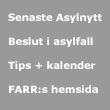ASYLNYTT
Sponsrad av Fridh Advokatbyrå
ARKIV:
EU:s flykting- och gränspolitik
Allmänt om migration, statistik

Asylnytt - Arkiv
EU:s flykting- och gränspolitik
Kriminalisering av hjälpare och arbetsgivare
Information från myndigheter och organisationer
Pressklipp saknas
- Arkiveringsdatum 190703:
- Picum: Study shows a rise sharp in citizens being criminalised for helping migrants
- Medelhavet/ UN Human Rights Office urges EU States to stop criminalizing solidarity
Arkiveringsdatum 220619:
Border Violence Monitoring Network 22-05-06:
Criminalisation report: Accused of solidarity
This report documents cases of criminalisation attempts experienced by BVMN's member organisations in several countries, mainly in the Western Balkans and Turkey in 2021. In order to contextualise these events, the report briefly introduces a definition of criminalisation, the political and legal environment, as well as relevant actors, and forms of criminalisation. In addition, it discusses the consequences of criminalisation for BVMN's member organisations and incidents of criminalisation they were subject to, listed after the countries they are located in.
The report observes a trend of deterioration in the situations of CSOs and their team members due to such incidents. Different forms of criminalisation, namely formal and informal criminalisation, scrutiny, obstacles related to visa procurement, defamation in the media and smear campaigns, as well as threats, harassment, and violence had huge negative consequences for the contributing member and partner organisations of the Network.
BVMN and its member organisations are one of several CSOs working in an increasingly restrictive environment to support and monitor the fundamental human rights of people-on-the-move in the EU. Here, the restrictive legal environment for CSOs working in this sector is combined with increasing societal, administrative, and police pressure. This is no longer a country-specific phenomenon, but rather a European- wide trend that, in line with the EU's externalisation policies on migration in general, extends well beyond its external borders.
(...)
Hämta rapporten (Extern länk)
Arkiveringsdatum 210314:
Red Cross EU Office 21-03-03:
Protecting the humanitarian space to access and support migrants
The European Union (EU) and Member States are increasingly relying on humanitarian actors to address the consequences of current policy choices on the vulnerability of migrants. However, the space for civil society actors to provide them with support in accordance with humanitarian principles has been significantly compromised in recent years.
National Red Cross Societies in the EU would like to remind Member States of their commitments to ensure that staff and volunteers in different countries are able to deliver humanitarian assistance to all migrants based solely on needs, and to support their access to services as well as their obligations in this regard. With the Global Compact for Safe, Orderly and Regular Migration, Member States have reaffirmed their responsibility to uphold migrants' access to essential services, regardless of their status. When they are unable to do so, Member States need to facilitate the work of humanitarian actors. Despite this, National Red Cross Societies increasingly experience challenges to act in accordance with their fundamental principles when delivering services and supporting all migrants in accessing the necessary support to ensure their safety, dignity, protection and well-being.
Recommendations
National Red Cross Societies in the EU thus make the following recommendations to the EU and Member States to secure a conducive environment for humanitarian actors to address migrants' vulnerabilities and needs, as well as mitigate the risks they face.
1) Guarantee that all migrants, irrespective of status, have safe and effective access to assistance and protection, including when delivered by humanitarian actors.
2) Amend legislation that hampers or criminalises providing humanitarian assistance to migrants.
3) Make sure the EU budget enables a needs-based and principled migration response.
4) Closely cooperate with civil society in developing, implementing and evaluating migration policies and programmes.
5) Ensure adequate protection of personal data.
Läs mer (Extern länk)
Arkiveringsdatum 190703:
Picum 19-06-20:
Study shows a rise sharp in citizens being criminalised for helping migrants
The report provides the most in-depth list of cases of criminalisation of solidarity to date. It finds that between 2015 and 2019, at least 158 individuals have been investigated or formally prosecuted for offering humanitarian assistance to migrants and refugees across 11 European countries. The vast majority of cases occurred in France, Italy and Greece.
Despite a drop in migrant arrivals, the number of cases increased dramatically in 2018, with 104 individuals reported - twice as many as 2017. The criminalisation of solidarity does not only affect human rights defenders, volunteers and crew members rescuing people at sea, but also ordinary citizens, doctors, journalists, mayors and religious leaders.
Seán Binder, who spent 106 days in pre-trial detention for his humanitarian work as a coordinator of civilian rescue operations in Greece in 2018, added:
"Humanitarian response and asylum seeking are enshrined in the EU charter of fundamental rights and international law - humanitarians are engaged in both legitimate and legal activities. In fact, civilian humanitarianism is a highly skilled operation that works to complement the lifesaving of the authorities, instead of hampering them. For instance, in my case, we were the only actors who provided immediate medical services and interpreters where the authorities had none."
"Beyond the legal proceedings highlighted in the report, Caritas Europa is also deeply concerned by all the other means used to deter acts of solidarity. This includes examples of violence and harassment by the police towards volunteers and obstacles to food distribution to migrants", says Maria Nyman, Secretary General of Caritas Europa.
(...)
Läs mer (Extern länk)
OHCHR 19-06-20:
UN Human Rights Office urges EU States to stop criminalizing solidarity
On World Refugee Day, the UN Human Rights Office in Brussels called on EU member States to prioritize saving the lives of refugees and migrants crossing the Mediterranean.
Between 2014 and June 2019, at least 9,241 deaths have been recorded, as estimated by the International Migration Organization, national authorities and media sources, while at the same time in recent years, NGO boats trying to save the lives of those in trouble at sea have been increasingly removed or rendered unable to operate, and hundreds of Europeans have been arrested, investigated, or threatened with prison or fines for trying to help migrants and refugees.
As of 1 June 2019, only seven out of the 24 humanitarian rescue ships operated by civil society organizations in the Mediterranean were still active, as recorded by the EU Fundamental Rights Agency.
The UN Human Rights Regional Office for Europe urged EU member States to urgently strengthen search and rescue operations and ensure rapid and safe disembarkation in a coordinated manner. States have a heightened duty to protect the right of everyone to seek and enjoy asylum from persecution, the right to leave any country and the right to life, as established by international human rights and humanitarian law. Individual human dignity should be at the centre of reforms of the European Common Asylum System, currently being considered by EU member States. These should include setting up effective EU-wide systems that enable swift support for those in vulnerable situations, including victims of violence and trafficking for purposes of sexual or labour exploitation.
(...)
Läs mer (Extern länk)
Källor: Informationen på denna sida är hämtad från följande källor (externa länkar): EU (kommissionen, ministerrådet, parlamentet och domstolen), Europarådet (mr-kommissionären, domstolen, kommittén mot tortyr), FN:s flyktingkommissariat UNHCR, FN:s kommitté mot tortyr m.fl. FN-organ, Sveriges Radio, SvT, andra svenska media via Nyhetsfilter och pressmeddelanden via Newsdesk, utländska media till exempel via Are You Syrious och Rights in Exile, internationella organisationer som Amnesty International, Human Rights Watch, ECRE, Statewatch och Picum, organisationer i Sverige som Rädda Barnen, Asylrättscentrum, Svenska Amnesty, FARR och #vistårinteut samt myndigheter och politiska organ som Migrationsverket, Sveriges domstolar, JO, Justitiedepartementet m.fl. departement och Sveriges Riksdag.
Bevakning: Hjalte Lagercrantz och Sanna Vestin. Sammanställning: Sanna Vestin. Asylnytt är ett ideellt projekt. Sponsring avser prenumerationsavgifter. Tips emottages tacksamt.

 innehåll
innehåll